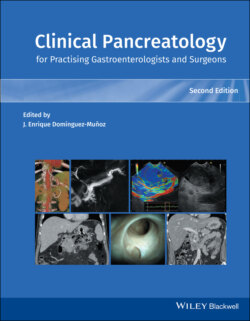Читать книгу Clinical Pancreatology for Practising Gastroenterologists and Surgeons - Группа авторов - Страница 171
Prevention of Infection of (Peri)pancreatic Necrosis
ОглавлениеIntestinal bacterial translocation is generally accepted as the main source of infection of pancreatic necrosis [18]. In fact, intestinal permeability is increased and splanchnic perfusion is impaired in severe acute pancreatitis [19,20]. In addition, the bacteria infecting pancreatic necrosis are mainly of intestinal origin [21]. Since antibiotic prophylaxis has failed to provide any benefit in acute necrotizing pancreatitis [4–9] and because it is definitely not recommended in clinical practice, avoiding intestinal bacterial translocation is the main aim in the prevention of infection of pancreatic necrosis.
Enteral nutrition is one of the pillars in the management of severe acute pancreatitis. This not only provides nutrients to a severely ill patient, but also maintains intestinal barrier function. Enteral nutrition improves luminal gut nutrition, enhances splanchnic blood flow, and may stimulate enteral motility, thus reducing the risk of intestinal bacterial overgrowth and bacterial translocation [22,23]. This explains, at least partly, why enteral nutrition is superior to parenteral nutrition in patients with severe acute pancreatitis in terms of infection of pancreatic necrosis, septic complications, and death [24,25].
Enteral nutrition can be delivered through a nasogastric or a nasojejunal tube [26,27]. Based on the similar efficacy and safety of both routes, nasogastric feeding is generally preferred as the first step in clinical practice. Nasojejunal feeding is mainly reserved for patients with gastric outflow obstruction and those with intolerance to gastric feeding.
Early initiation of enteral feeding was generally recommended in clinical practice for patients with predicted severe acute pancreatitis. However, recent clinical trials have shown that early feeding is not associated with a reduction in infection, persistent organ failure, or mortality [28,29]. Based on this, enteral feeding can be delayed and given on demand to patients who are unable to tolerate oral refeeding after 72 hours from onset of acute pancreatitis.
